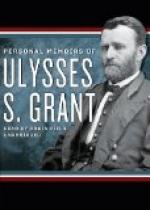The criticism has often been made that the Union troops should have been intrenched at Shiloh. Up to that time the pick and spade had been but little resorted to at the West. I had, however, taken this subject under consideration soon after re-assuming command in the field, and, as already stated, my only military engineer reported unfavorably. Besides this, the troops with me, officers and men, needed discipline and drill more than they did experience with the pick, shovel and axe. Reinforcements were arriving almost daily, composed of troops that had been hastily thrown together into companies and regiments—fragments of incomplete organizations, the men and officers strangers to each other. Under all these circumstances I concluded that drill and discipline were worth more to our men than fortifications.
General Buell was a brave, intelligent officer, with as much professional pride and ambition of a commendable sort as I ever knew. I had been two years at West Point with him, and had served with him afterwards, in garrison and in the Mexican war, several years more. He was not given in early life or in mature years to forming intimate acquaintances. He was studious by habit, and commanded the confidence and respect of all who knew him. He was a strict disciplinarian, and perhaps did not distinguish sufficiently between the volunteer who “enlisted for the war” and the soldier who serves in time of peace. One system embraced men who risked life for a principle, and often men of social standing, competence, or wealth and independence of character. The other includes, as a rule, only men who could not do as well in any other occupation. General Buell became an object of harsh criticism later, some going so far as to challenge his loyalty. No one who knew him ever believed him capable of a dishonorable act, and nothing could be more dishonorable than to accept high rank and command in war and then betray the trust. When I came into command of the army in 1864, I requested the Secretary of War to restore General Buell to duty.
After the war, during the summer of 1865, I travelled considerably through the North, and was everywhere met by large numbers of people. Every one had his opinion about the manner in which the war had been conducted: who among the generals had failed, how, and why. Correspondents of the press were ever on hand to hear every word dropped, and were not always disposed to report correctly what did not confirm their preconceived notions, either about the conduct of the war or the individuals concerned in it. The opportunity frequently occurred for me to defend General Buell against what I believed to be most unjust charges. On one occasion a correspondent put in my mouth the very charge I had so often refuted—of disloyalty. This brought from General Buell a very severe retort, which I saw in the New York World some time before I received the letter itself. I could very well understand his grievance at seeing untrue and disgraceful charges apparently sustained by an officer who, at the time, was at the head of the army. I replied to him, but not through the press. I kept no copy of my letter, nor did I ever see it in print; neither did I receive an answer.




